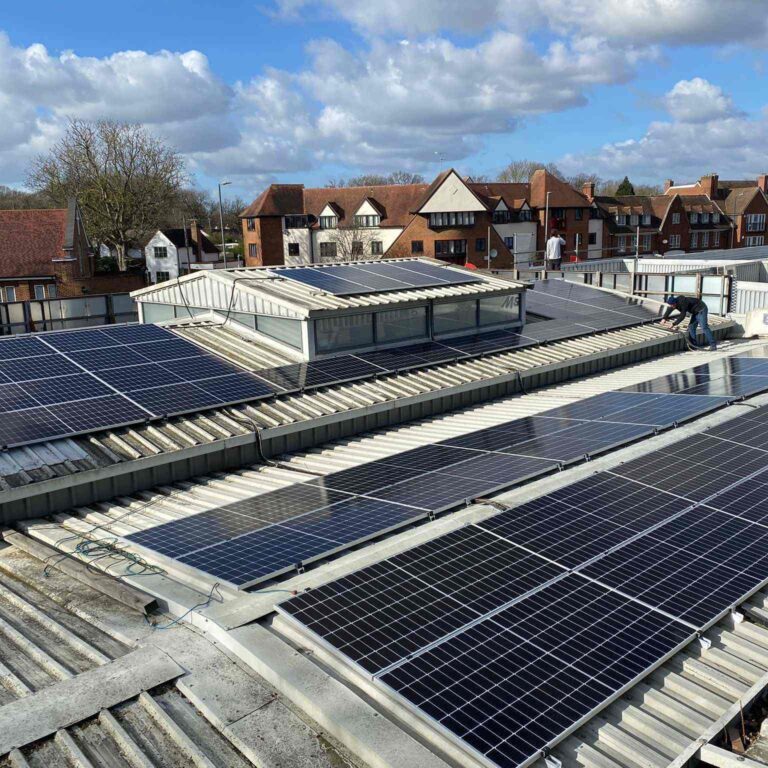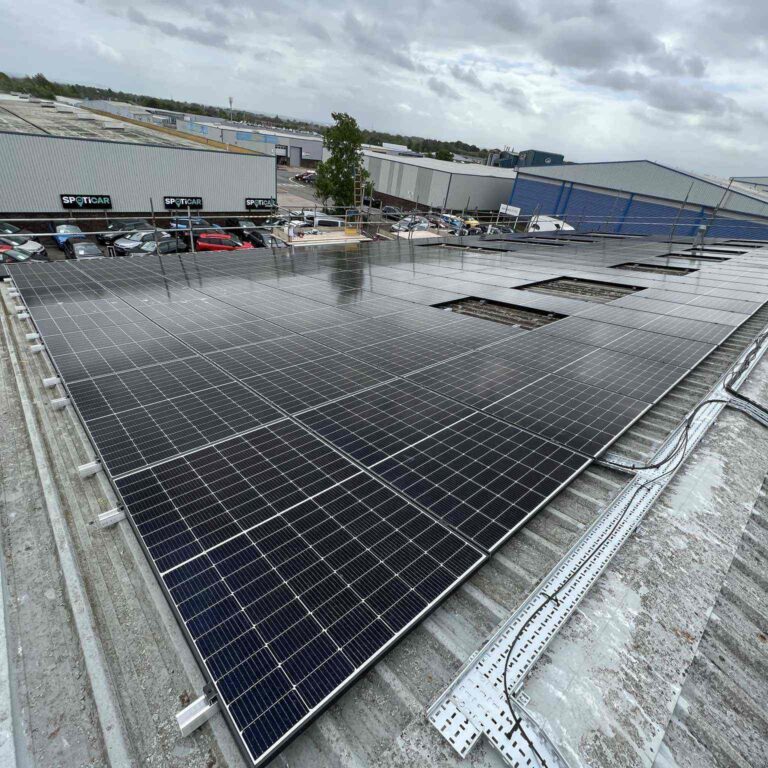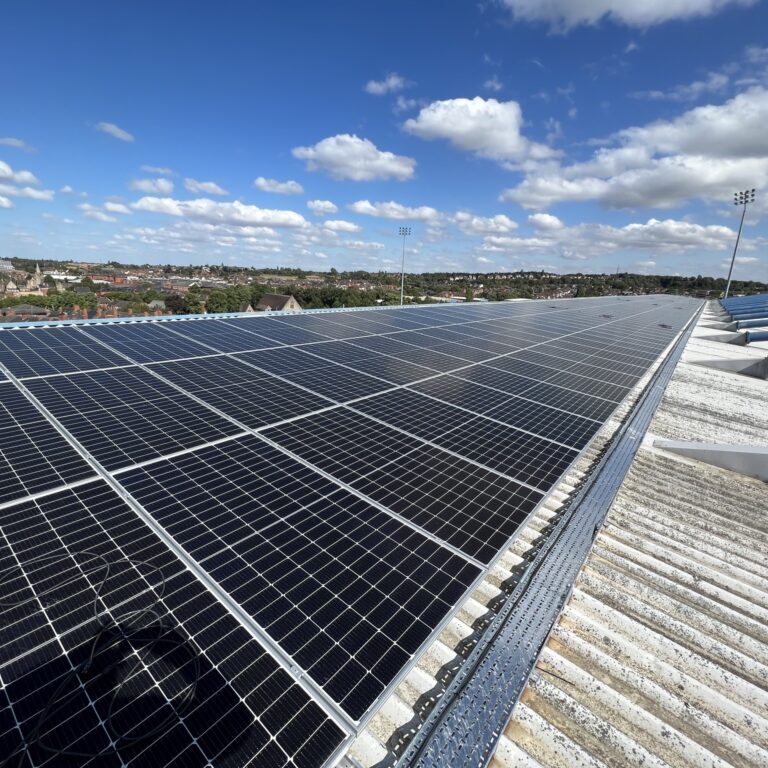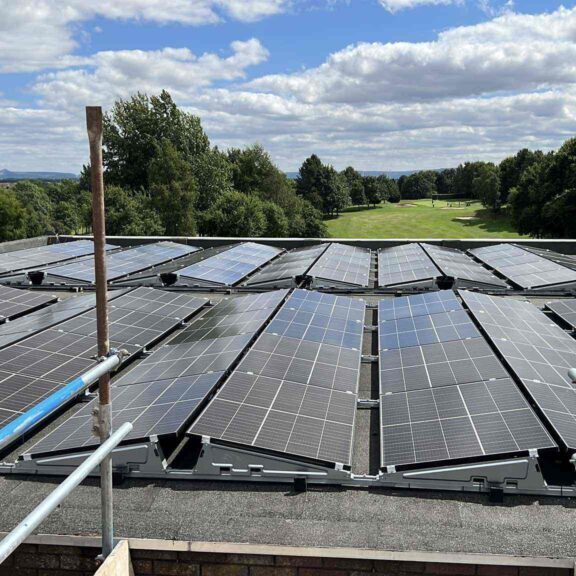Investing in renewable energy has become a strategic priority for many businesses in the UK. With rising energy costs and increasing environmental awareness, companies are looking for ways to reduce expenses and enhance their sustainability profiles. One of the most effective ways to achieve these goals is by investing in commercial solar panels. Understanding the return on investment (ROI) of commercial solar panels is crucial for making informed decisions that can lead to significant long-term benefits. This article will explore what UK businesses need to know about the ROI of commercial solar panels, providing insights into financial savings, payback periods, and the overall impact on your business. Typically businesses in the UK see around a 25% ROI per annum on commercial solar panels.
What is the ROI of Commercial Solar Panels?
The ROI of commercial solar panels refers to the financial return a business can expect from its investment in solar energy. This return is typically measured in terms of the payback period (the time it takes to recoup the initial investment) and the long-term savings on energy costs. For UK companies, the ROI of commercial solar panels can be substantial, especially when considering the rising costs of electricity and the various incentives available for adopting renewable energy.
Calculating the ROI of commercial solar panels involves several factors, including the cost of the solar installation, the amount of energy the system will generate, potential savings on energy bills, and any government incentives or tax reliefs that apply. Understanding these factors is essential for businesses looking to make a smart investment in solar energy.
Factors Affecting the ROI of Commercial Solar Panels
Several key factors influence the ROI of commercial solar panels. By understanding these factors, UK businesses can better assess the potential benefits and make informed decisions about their solar investments.
1. Initial Installation Costs
The initial installation cost is one of the most significant factors affecting the ROI of commercial solar panels. This cost includes the price of the solar panels, inverters, mounting systems, and installation services. While the upfront investment can be substantial, it’s important to remember that the cost of solar technology has been steadily decreasing, making it more accessible for businesses of all sizes.
In the UK, businesses can also take advantage of tax incentives such as the Enhanced Capital Allowance (ECA), which allows companies to claim 100% of the cost of qualifying energy-saving equipment against their taxable profits. This can significantly reduce the initial cost and improve the ROI of commercial solar panels.
2. Energy Generation and Savings
The amount of energy generated by a commercial solar panel system directly impacts its ROI. Factors such as the size of the installation, the location of your business, and the amount of sunlight your area receives all play a role in determining how much electricity your system will produce.
In the UK, even with its often cloudy weather, solar panels can still generate a substantial amount of energy. This energy can be used to power your business operations, reducing your reliance on the national grid and lowering your electricity bills. The more energy your solar panels generate, the greater your savings, leading to a higher ROI.
3. Government Incentives and Rebates
Government incentives and rebates are another critical factor influencing the ROI of commercial solar panels. In the UK, businesses can benefit from several financial incentives designed to encourage the adoption of renewable energy. The Smart Export Guarantee (SEG) is one such incentive, allowing businesses to earn money by exporting excess electricity generated by their solar panels back to the grid.
By taking advantage of these incentives, businesses can significantly enhance the ROI of commercial solar panels. These programs not only reduce the payback period but also provide ongoing financial benefits that can contribute to long-term profitability.
4. Energy Prices
The current and future cost of electricity is another important factor when calculating the ROI of commercial solar panels. As energy prices in the UK continue to rise, the savings generated by solar energy become more significant. By generating your own electricity, your business can lock in stable energy costs and protect itself from future price increases.
This price stability is particularly valuable for long-term financial planning, allowing businesses to budget more effectively and allocate resources with greater confidence.
The Payback Period of Commercial Solar Panels
The payback period is a crucial metric when assessing the ROI of commercial solar panels. This period refers to the amount of time it takes for a business to recoup its initial investment through savings on energy bills and other financial benefits. For UK companies, the payback period for commercial solar panels typically ranges from five to seven years, depending on factors such as installation costs, energy generation, and available incentives.
After the payback period, the electricity generated by the solar panels is essentially free, providing your business with decades of cost-free energy. This long-term financial benefit is one of the primary reasons why the ROI of commercial solar panels is so attractive.
Long-Term Financial Benefits of Commercial Solar Panels
Beyond the payback period, the ROI of commercial solar panels continues to deliver significant long-term financial benefits. These include ongoing savings on energy bills, increased property value, and additional revenue streams from programs like the SEG. Let’s explore these benefits in more detail:
1. Ongoing Energy Savings
The most obvious long-term benefit of commercial solar panels is the ongoing savings on energy costs. Once your solar panels are installed, they will continue to generate electricity for 25 years or more, providing your business with a consistent source of free energy. These savings can add up to tens or even hundreds of thousands of pounds over the lifetime of the system, significantly enhancing the ROI of commercial solar panels.
2. Increased Property Value
Installing commercial solar panels can also increase the value of your business premises. Properties equipped with solar energy systems are increasingly seen as more desirable, particularly as energy costs continue to rise. Should you decide to sell or lease your property in the future, having an established solar energy system can make it more attractive to potential buyers or tenants, boosting its market value.
This increase in property value is an often-overlooked aspect of the ROI of commercial solar panels, but it can provide significant financial benefits in the long run.
3. Additional Revenue Streams
As mentioned earlier, programs like the SEG allow businesses to earn money by exporting excess electricity generated by their solar panels back to the grid. This creates an additional revenue stream that can further improve the ROI of commercial solar panels.
By participating in these programs, your business can maximise the financial benefits of its solar investment, contributing to a stronger bottom line.
Environmental and Corporate Social Responsibility (CSR) Benefits
While the financial ROI of commercial solar panels is undoubtedly important, it’s also worth considering the environmental and corporate social responsibility (CSR) benefits. By investing in solar energy, your business can significantly reduce its carbon footprint and contribute to the fight against climate change.
This commitment to sustainability can enhance your business’s reputation, attracting environmentally conscious customers, investors, and partners. In today’s market, consumers are increasingly favouring companies that demonstrate a commitment to environmental responsibility, making the ROI of commercial solar panels extend beyond just financial gains.
Conclusion: The Strategic Value of Understanding the ROI of Commercial Solar Panels
Understanding the ROI of commercial solar panels is essential for UK businesses looking to invest in renewable energy. By considering factors such as installation costs, energy generation, government incentives, and long-term savings, your business can make an informed decision that delivers significant financial and environmental benefits.
The ROI of commercial solar panels is not just about short-term savings; it’s a strategic investment that can provide ongoing financial benefits for decades. With a typical payback period of five to seven years, businesses can enjoy decades of cost-free energy, increased property value, and additional revenue streams. Moreover, by reducing your carbon footprint and enhancing your CSR profile, your business can position itself as a leader in sustainability.
In conclusion, the ROI of commercial solar panels is a compelling reason for UK businesses to consider solar energy as a key part of their long-term strategy. With rising energy costs and growing environmental concerns, there has never been a better time to invest in solar power and reap the financial and environmental rewards.



